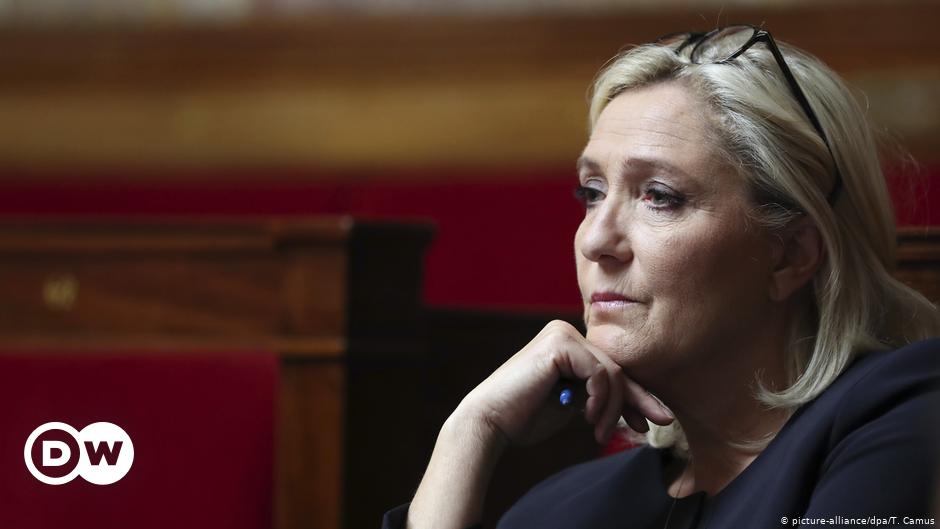
France’s far-right National Rally failed to win a single region in elections, according to partial results published Monday by the French Interior Ministry.
The second-round vote, which was hit by poor turnout of an estimated 35%, represented a blow to Marine Le Pen’s hopes of securing the presidency next year.
The National Rally party, formerly known as the National Front, received 19.4% of the second-round vote nationally, BFMTV cited partial results.
She later hit out at mainstream parties for doing deals to keep her party out of power.
“This evening we have not won any region,” Le Pen told supporters, blaming “unnatural alliances” between foes.
As many as 13 mainland French regions were up for grabs, as well as seats in 96 departments.
Around 35% of voters cast their ballots on Sunday
Hopes of Provence win dashed
The National Rally had hoped to win in the southern Mediterranean region of Provence-Alpes-Côte-d’Azur (PACA).
Thierry Mariani, a high-profile defector from the conservative Republicans party, had been hotly tipped to come out on top.
The French MEP served as a minister under former French president, Nicolas Sarkozy.
But he won just 42.7% in the second round, losing out to the center-right candidate Renaud Muselier, according to partial results.
Le Pen, who quit the party leadership last year to focus on the race for the Elysee, has been trying to reshape its image amid accusations of antisemitism and Islamophobia in the past.
The 52-year-old lost four years ago to current French president, Emmanuel Macron. The pair are predicted to go head-to-head again next year.
How did President Macron’s party perform?
President Macron’s Republic on the Move (LREM) has not won a single region across France.
French government spokesman Gabriel Attal called the results “a “disappointment” in an interview with France 2.
Macron’s ruling party was not projected to win any of the regions
Observers say the regional vote could shift the balance between political heavyweights vying for a position in the 2022 presidential race.
But last week’s polls prompted cross-party concern over low turnout, with less than 34% of voters casting their ballot.
On Sunday, the numbers were also low. By 5 p.m, local time (1500 UTC), turnout nationwide was 27.89%, according the country’s interior ministry. Polls officially closed at 8 p.m. local time.
France was holding the runoff vote as the first round did not see any parties win over 50%. Only parties that garnered 10% of ballots advanced to that crucial second vote.
What happened in the first round?
Last Sunday, the first round saw a defeat for President Emmanuel Macron’s ruling party, the Republic on the Move (LREM), which is on course to win none of the 13 regions. It was also disappointing for far-right leader Marine Le Pen.
Although several LREM ministers campaigned, the party did not gain the required 10% in some regions to make the runoffs.
Macron himself embarked on a nationwide tour that saw him slapped by an onlooker at one point.
Watch video 03:41 France voted in regional elections – Lisa Louis reports
Earlier opinion polls had projected Le Pen’s party would come first in some regions, but it only came top in one — the southeastern region of Provence-Alpes-Cote d’Azur.
After being decimated by Macron in the 2017 presidential and legislative elections, the traditional center-right conservatives, the Republicans, staged a surprise comeback in the first round.
The Republicans, who currently run seven of France’s most populous regions, won the most overall votes.
The Socialists were also expected to pick up some regions as they are backed by the far-left France Unbowed party.
Who could be a presidential challenger?
Xavier Bertrand, a former health minister from the northern Hauts-de-France region, has emerged as the conservatives’ favorite in opinion polls to become the party’s face in the presidential election.
He won the Hauts-de-France region around Calais in the north, which had also been seen as a potential gain for Le Pen’s National Rally.
“The far-right has been stopped in its tracks and we have pushed it back sharply,” Bertrand said.
Macron’s aides see Bertrand as a threat to the president’s center-right voter base.
Two conservatives, Valerie Pecresse in the greater Paris region and Laurent Wauquiez in the greater Lyon area, could challenge Bertrand if they win Sunday’s elections.
jf,fb/dj (AFP, Reuters)








